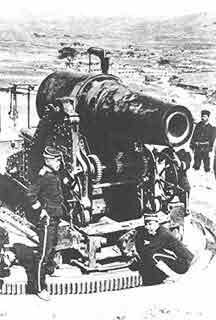
Departments

NICHIRO - SENSŌ
日露戦争
The Russo-Japanese War
Background: the Anglo-Japanese Alliance
In 1902, Japan and Great Britain concluded an agreement for a formal alliance. The alliance included a number of important benefits for Japan. At the turn of the twentieth century, Japan was trying to modernize its navy, and Great Britain (then the world’s premier naval power) agreed to provide training for Japanese naval officers.
Even more important were mutual defense clauses of the alliance. Japan and Great Britain agreed to come to each other’s aid in the event that either country was at war with two or more nations. In wars involving one against one, both countries simply agreed to remain neutral. This aspect of the alliance would be Japan’s insurance policy in its 1904-1905 war with Russia.
Tensions in Korea
By the early 1900s, tensions between Czarist Russia and Japan were building. Both countries wanted to dominate Korea and the Chinese region of Manchuria; and Russia was already placing troops in both areas.
The Japanese were still simmering from an earlier humiliation at the hands of the Western powers. In 1895, Japan had won a brief war with China. The original peace treaty gave Japan the rights to the Chinese Liaodong peninsula. But Japan was not to enjoy this part of its victory. Russia colluded with France and Germany to force the Japanese to give up their claims to Liaodong. Then three years later, the Czar pressured the Chinese government to allow a Russian base on the Liaodong peninsula, at the strategically important seaport of Port Arthur. Port Arthur allowed direct sea access to both Japan and Korea.
The Japanese opened negotiations to reduce the Russian military presence that was growing at their back doorstep, but these talks were ultimately fruitless. The Japanese government determined that military action was its only option.
Japan’s alliance with Britain assured that the war with Russia would be limited. If not for the Anglo-Japanese alliance, taking on Russia would have meant a war with France as well. (France and Czarist Russia were close allies.) But the Japanese figured (correctly, as it turned out) that France would not risk war with Great Britain.

A Japanese artillery unit during the Russo-Japanese War
The Japanese Attack Port Arthur, then Decimate the Russian Baltic Fleet
In February 1904, Japanese forces attacked the Russian Pacific Fleet at Port Arthur, severely crippling it. They launched their attack without issuing a formal declaration of war. Despite this impropriety, the London Times praised the Japanese action as “daring.”
Reeling from the blow at Port Arthur and anxious for revenge, the Russian high command sent their Baltic Fleet against the Japanese navy. The Russian and Japanese ships met in the Tsushima Strait. Within an hour, Japanese Admiral Togo annihilated the Russians, sending practically every one of the Czar’s vessels to the ocean’s bottom.
Land War Stalemate and the Treaty of Portsmouth
The land war was less decisive. Both countries had to provision troops over long supply lines. The war slogged to a stalemate, and Japan’s domestic economy buckled from the strain of the war effort. When U.S. President Theodore Roosevelt offered to mediate peace terms, both sides were exhausted and ready to put an end to the fighting.
The subsequent Treaty of Portsmouth was signed in Portsmouth, New Hampshire in September 1905. Under the terms of the treaty, Russia acknowledged Japan as the dominant political and military power over Korea. The Russians also ceded economic resources in Manchuria, and the southern half of Sakhalin Island.

A postcard commemorating the Treaty of Portsmouth
The world took notice of Japan’s victory. British newspapers dubbed Japan a “giant killer.” A London editorial cartoon of the day shows a samurai warrior brandishing a sword at a Russian bear. In other Western capitals, there were prophetic proclamations that Japan would not be content with the territory it had won from Russia.
Japan’s victory over a European power was at first a source of inspiration for Asian independence movements in lands that had been colonized by Western nations. But the view of Japan as a liberator was short-lived. Following its victory over Russia, Japan made Korea a subordinate protectorate. The Japanese government forced the Korean king to abdicate, and a Japanese “resident-general,” Ito Hirobumi, was installed in his place. A Korean nationalist assassinated Hirobumi in 1909; and Japan proceeded with the outright annexation of Korea the following year. The Koreans would not regain their freedom until Japan was defeated at the end of World War II.
